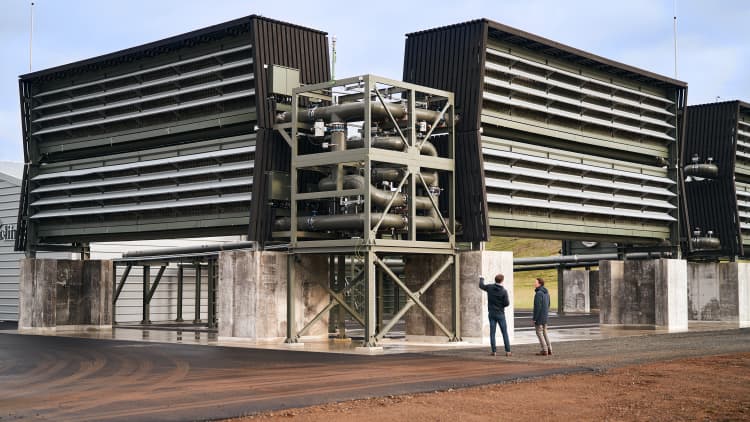[ad_1]
S3studio | Getty Images News | Getty Images
JPMorgan Chase announced Tuesday that it has agreed to spend more than $200 million on a combination of carbon removal technologies.
The spending will be allocated to long-term agreements to remove and store the equivalent of 800,000 metric tons of carbon dioxide from the atmosphere, JPMorgan said in a written statement.
The first $75 million commitment of the $200 million was announced in April when JPMorgan said it was joining Frontier, the benefits company owned by payment processor Stripe that makes commitments for its member companies, including Alphabet, McKinsey, Meta and Shopify.
The investment in carbon removal and long-term contracts with carbon removal companies is both a move to support the still nascent carbon removal industry and will enable the bank to remove the equivalent of the carbon emissions that are otherwise hard to abate from its direct operations by 2030, JPMorgan said.
“Financing promising technologies needed to help accelerate the low-carbon transition requires capital and expertise. We’re working to drive scalable development of carbon removal and storage as commercial solutions and aim to send a strong market signal,” Daniel Pinto, president and chief operating officer of JPMorgan Chase, said in a written statement.
While the market for carbon removal is still small right now, the U.N. Intergovernmental Panel on Climate Change has projected that by 2050, the world will have to remove the equivalent of 10 gigatons of carbon dioxide per year.
JPMorgan has signed a $20 million, nine-year agreement with the Swiss company Climeworks to deliver the equivalent of 25,000 metric tons of carbon dioxide from the atmosphere. Climeworks is one of the market leaders in direct air capture, a process akin to vacuuming carbon dioxide out of the air.
“The finance industry has no doubt become a trailblazer in supporting the scale up of high-quality carbon removal solutions,” Christoph Gebald, co-founder and co-CEO of Climeworks, said in a statement about the deal. “[T]oday marks a new milestone in this field.”
JPMorgan also signed a deal with Charm Industrial, a carbon storage company that converts excess organic material such as corn stover — the stalks, leaves and cobs that remain in fields after the corn harvest, and which would otherwise decay and release carbon dioxide into the air — into a bio-oil and then put that oil into the ground in abandoned oil wells. The deal with Charm aims to remove and store the equivalent of approximately 28,500 metric tons of carbon dioxide over five years.
The carbon removal and storage deliveries from Charm for JPMorgan have already started, the bank said.

[ad_2]




















